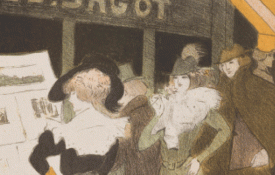“How’d you know I needed this?”
It’s one of the best responses you can receive when you drop someone a thoughtful note—and a simple reminder that Kindness can be a fundamental human need.
In the face of the collective challenges we face today, it is crucial to remember the value of Kindness. And to pause, for just a moment, to think about how we think about Kindness.
Words matter and my love for them started early. Growing up I’d try to learn to spell the longest words I could find. I remember being in the bathtub at age 6 trying to learn how to sound out “temperature.” My mom would patiently break the word apart: tem·per·a·ture.
I would scour the internet for bigger and sillier spelling challenges. When I was 11, I tackled “pneumonoultramicroscopicsilicovolcanoconiosis.” Before you start a not-so-quick Google search (it takes a minute just to type it), I’ll fill you in on its meaning: It’s a lung disease caused by the inhalation of fine silica or quartz dust. It’s the longest English word on the market at 45 letters, and I spent a full 48 hours trying to memorize it.
Maybe it was just my only-child desire to win at all things, but even beyond winning, I’ve always been drawn to the power of words. Language is one of the primary ways we understand the world we inhabit, playing a starring role in how we process everything from color to moral judgments. It dictates how we construct and remember events, categorize objects, process smells and sounds, think about time, do mental math, and experience and express emotions. You get the point. Words are kind of a big deal.

Kraft’s book Deep Kindness comes out September 29, 2020.
Take for example the word “Kindness.” We think about it as a nice-to-have instead of a must-have. It’s easy to forget about how deep our human desire is for appreciation, acknowledgment, and belonging. It is essential—not an extra.
And we sometimes think we are being kind when we’re actually just being nice.
I didn’t really consider the difference until I spoke at a small school in Texas a few years ago. The topic, of course, was Kindness. At the end, a swaggering senior boy walked up to me. “Hey man, I realized today I’m a really nice person.”
I thought he was messing with me. I was wrong.
“The way you talked about things today,” he said, “I realized that I’m nice, but I don’t think I’m kind. Most of my school says they’re kind, but they’re actually just nice. They’re helpful when it’s convenient. They’ll show up for someone if they like them or agree with them already. They’ll pick up someone’s books if they drop them, but only if they think they’re cute. Nice is reactive, you know?”
I encouraged him to keep going. He was on a roll.
“Nice is reactive, but the way you talked about kindness today, I realized it has to be proactive. I have to practice it even when it’s messy and uncomfortable. When it’s inconvenient. When there is nothing in it for me. I realized that kindness requires a lot of work. And I realized that I have a lot of work to do.”
He was crying by the end. He hugged me and left through the double doors.
Kindness is harder than it looks. To improve at it is expensive—and the biggest costs are convenience and comfort. Nice steps back, while Kindness steps up. Nice happens when there is time; Kindness happens because we make time. Nice expects something in return, while Kindness is free from expectation.
To put it simply: Nice people don’t change the world, but Kind people can.
When we change the way we think about something, it changes the way we act with it. Kind > nice.
And as my friend in Texas reminded me, we’ve got a lot of work to do.
So where might we start this essential work?
In our words.
Complimenting people (and developing the communication skills necessary to do so) is one of the most effective and low-burden exercises available to us. Unfortunately, the idea of the “compliment” gets reduced by our culture into generic gratitudes and platitudes co-opted by the greeting card industry.
Mass-produced Kindness is usually nonspecific and uninteresting.
In its most raw and rewarding form, the skill of the “compliment” is the skill of seeing the good in others and having the vocabulary and vulnerability to tell them about the good you see.
That’s a skill we can all work on.
When it comes to communicating Kindness, specificity is important. Think about the difference between receiving a generic compliment like “You’re beautiful!” versus the handmade card or homemade phone call you receive that details how you’ve been influential in someone’s life. One might give us a few moments of joy, while the other moves us profoundly. Why? Because real, deep Kindness is generated from the hard work of building meaningful connections.
Complimenting others can be fun, light, and playful, but it can also be an incredibly powerful exercise in celebrating and honoring people we care about. Specificity helps increase relevance to the recipient and makes it stick in their memory. So, here are three prompts to help put Kindness into action directed at specific people in your life.
This exercise requires two steps: Think of the first person who comes to mind that fits the description, then send a text or call that person and fill in the blanks to practice some Kind Communication.
1. The person who is braver than anyone I know …
“Superheroes have costumes, but you don’t need a cape or mask to be ____. That time when you _____? Yeah, I remember thinking ______. Thank you for your bravery in this world.”
2. The person who helps make the world a better place …
There is so much negativity in the world, but you have always been ______. I admire you so much for your ______ and am constantly inspired when I think of you doing _____. The world needs way more ____ and a whole lot more You.”
3. The person who enjoys dancing in the rain …
“A free spirit like yours never minds getting _____. You are bold, _____, and _____. I am always inspired by your _____ and am forever grateful that we are ____.”
These individual people each deserve their own kind of attention. Their own carefully chosen words. Their own curated Kindness experience. We must actively work to have a dexterity of language that matches the depth of our love.
The kind of Kindness the world needs is specific and intentional. It is capable of identifying the unique gifts that each person carries, and can express with rich clarity why that quality is so important to the individual or to the world. The kind of Kindness we need is one with a learned vocabulary dedicated to healing wounds with attentive words and empowering changemakers with thoughtful encouragement. It knows that sometimes we are just a few inspiring words away from a revelation or a revolution.
“How’d you know I needed this?”
Because we are all in need of this.
Make time today to choose to give it.













































